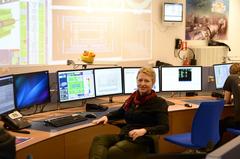URL: https://www.desy.de/news/news_search/index_eng.html
Breadcrumb Navigation
DESY News: Beate Heinemann to become a leading scientist at DESY and professor at Freiburg University
News
News from the DESY research centre
Beate Heinemann to become a leading scientist at DESY and professor at Freiburg University
Particle physicist Beate Heinemann has accepted a joint appointment by DESY and the University of Freiburg and will be joining DESY’s ATLAS Group from 1 August as leading scientist. Having completed both her dissertation and her doctoral thesis at DESY, Beate Heinemann has most recently been a professor at the University of California, Berkeley. Since 2007, she has been a member of the ATLAS collaboration, becoming its deputy spokesperson in 2013, a position she will continue to hold until February 2017.

Beate Heinemann in the main ATLAS control room at CERN.
For her new task, Beate Heinemann will work in Hamburg and Freiburg and also regularly teach courses. In the field of research, she will be closely involved in the planned detector upgrade for the high-luminosity phase of the LHC, starting in 2026. This requires new, substantially more radiation-resistant detector components, which are currently being designed. DESY and the University of Freiburg are working together very closely on building an end cap for the silicon strip detector for the ATLAS detector. Constructing this will take many years, and the detector should be ready to be installed in the LHC towards the middle of the next decade.
Apart from working on the silicon strip detector, Heinemann will primarily concentrate on the search for dark matter and related measurements, examining, for example, whether Higgs bosons decay into dark matter or whether dark matter is formed in the LHC by other means, for example through the decay of supersymmetric particles.
“The ATLAS groups at DESY and Freiburg University are both excellent, and I am really looking forward to working with scientists at both these sites,” says Beate Heinemann, “especially since I hope and expect the next few years at the LHC to be extremely interesting ones.“



